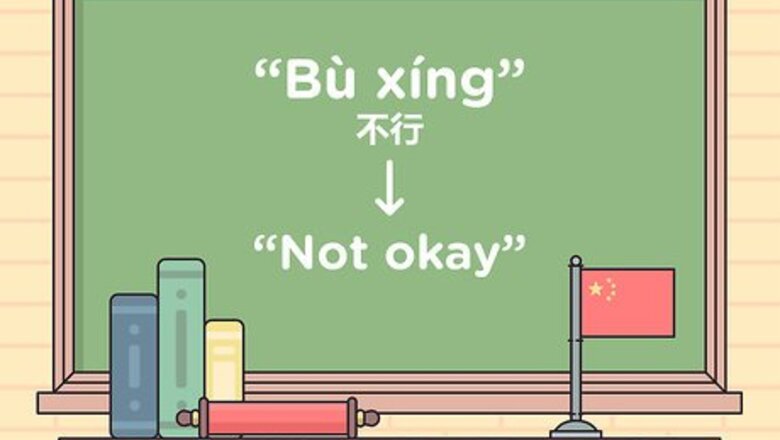
views
X
Research source
Answering a Question
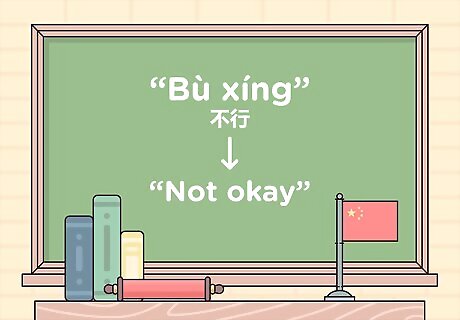
Say "bù xíng" (不行) if someone asks your permission and you want to refuse. The phrase "bù xíng" literally means "not okay." Pronounce this phrase "boo sheeng." For the first word, your voice should start at a higher pitch and then fall to a lower pitch. In Mandarin, this is known as the fourth, or falling, tone. For the second word, start with a low pitch and raise your pitch higher. This is the second, or rising, tone. This phrase is appropriate when someone asks your permission to do something, or asks you to give them something, and you don't want to go along with that. For example, if someone asked to borrow your credit card, you might respond "bù xíng."
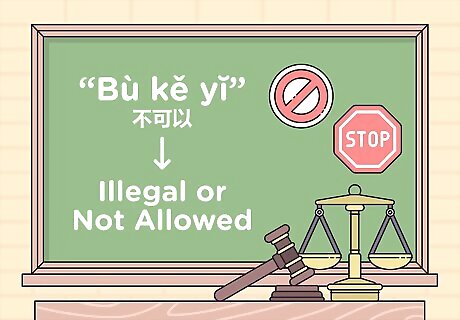
Switch to "bù kě yǐ" (不可以) if something is illegal or not allowed. "Bù kĕ yĭ," pronounced "boo kah yee," is similar in meaning to "bù xíng," but is typically used when you're talking about something you have no control over. The literal meaning of the phrase is "not can." This phrase introduces a third tone, in which you lower the pitch of your voice and then raise it. The second word, "kĕ," is pronounced with a second rising tone, since the word immediately after it has a third tone.
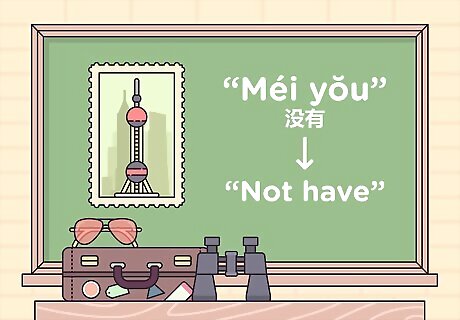
Use "méi yǒu" (没有) to say you don't have something. This phrase, pronounced "may-ee yooh," is used when someone asks you if you have something and you don't. It's also used if someone asks you if you've been to a place or experienced something and you haven't. It literally means "not have." For example, if someone asked you if you'd ever been to Shanghai, and you never had, you might respond "méi yŏu."
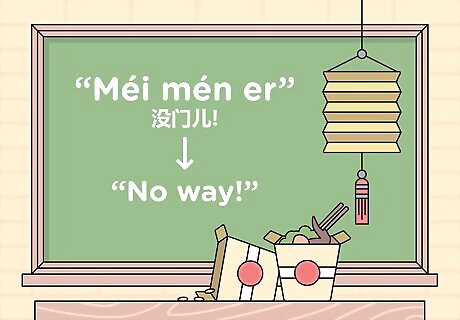
Exclaim "méi mén er!" (没门儿!) if you want to be more emphatic. The phrase "méi mén er," pronounced "may-ee mahr," means "no way." Someone might ask you something, and you respond with a softer answer. If they ask you again, you might use this phrase to indicate that there's no point in asking you again, you aren't going to agree to whatever it is they want. For example, suppose someone asks to borrow your credit card and you respond "bù xíng." They then repeat their question. The second time, you might respond "méi mén er!" to let them know that the subject is closed and you aren't going to let them borrow your credit card.
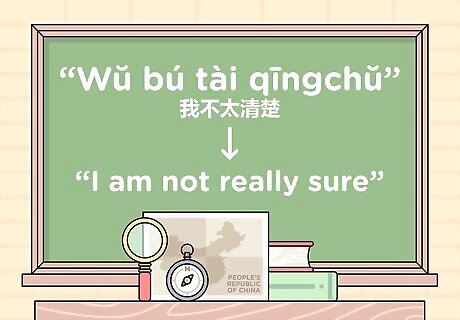
Dodge a question you would rather not answer with "wǒ bú tài qīngchǔ" (我不太清楚). Sometimes, someone will ask you a question that you don't feel comfortable answering. They also might ask you for advice or information that you don't want to give them. In those situations, you can respond "wǒ bú tài qīngchǔ" (pronounced "wah-deh boo tie cheen-chooh"). This phrase more literally means "I am not really sure." However, it is also used as a sort of avoidance strategy to dodge the question. The person who asked the question will understand that while you may know the answer to the question they asked, you are unwilling to provide it to them.Culture Tip: The art of saying "no" in China is closely tied to the Chinese concept of saving face. You essentially protect the "face" of the person asking you the question by not directly rejecting them. You also protect your own "face" by not having to say something potentially embarrassing or negative.
Disagreeing with a Statement
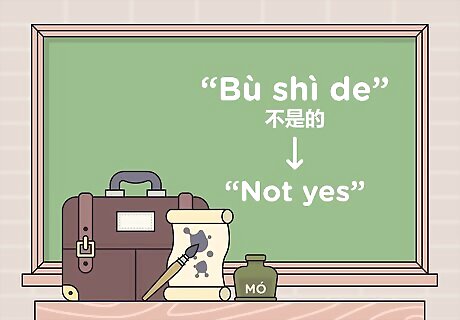
Use "bù shì de" (不是的) to correct a factual misstatement. The phrase "bù shì de," pronounced "boo shih duh," is typically used when someone says something that isn't true and you want to let them know that. This phrase is used with concrete facts that can be proven true or false. For example, if you are working and someone comes in and asks you if you're the boss, you might respond "bù shì de." The phrase literally means "not yes." To say this phrase with the correct tone of voice, use the fourth tone. Your voice starts at a higher pitch and falls to a lower pitch. The third word is said with a neutral tone, meaning that your voice should neither rise nor fall in pitch.
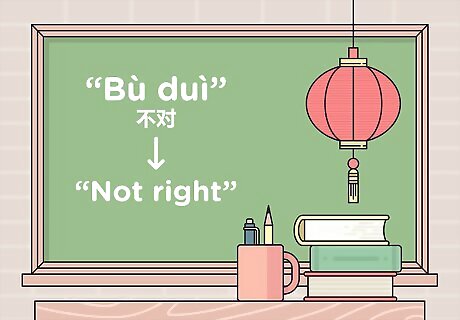
Say "bù duì" (不对) if you disagree with someone's opinion. The phrase "bù duì," pronounced "boo doo-ay," literally means "not right." This phrase typically isn't used to respond to incorrect facts, however. Instead, you would say it if you wanted to disagree with a statement someone made, typically a belief or opinion. For example, if someone said to you that all Japanese people like sushi and you are a Japanese person who hates sushi, you might say "bù duì." Then you could explain your position on the matter.
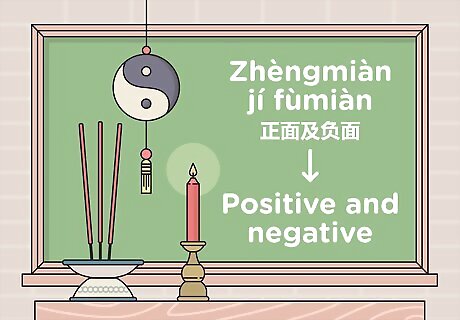
Mention the positive before the negative. Generally, if you disagree with something someone has said, it's polite to make a positive statement in Chinese before you make a negative statement. This places more emphasis on the positive than the negative. To use this formula, however, you'll need at least basic conversational skills in Chinese. For example, if someone proposes a trip that you think would be too expensive, you might start by talking about how wonderful it would be to go to that place. Then you could bring up the issue of finances.Culture Tip: You can also start by asking a question, rather than stating your disagreement upfront. The question might encourage the other person to think about something they hadn't considered and come around to your point of view.
Refusing an Offer
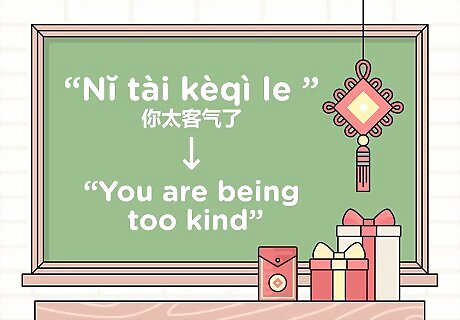
Decline a gift before accepting it to show modesty. It's common for Chinese people to refuse gifts ritually before finally accepting them. This demonstrates modesty, which is a highly valued trait in Chinese culture. This ritual is not all that different from someone saying "Oh, you shouldn't have" in English when given a gift. Some phrases you can use to ritualistically decline gifts include: Nǐ tài kèqì le (你太客气了): You are being too kind. Bù hǎo yìsi (/不好意思): Sorry to bother you. Gàn má dài dōngxi lái? (干嘛带东西来?): Why do you bring gifts?
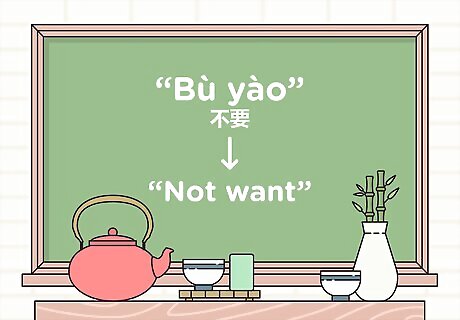
Say "bù yào" (不要) to indicate that you don't want something. If someone asks you if you want something and you don't, you might respond "bù yào." This phrase is pronounced "boo yow," with two falling fourth tones. Start with a higher pitch for each word, letting it fall to a lower pitch. The phrase literally means "not want." For example, if someone asks you if you want a cup of coffee, you might say "bù yào."Tip: This phrase is used more often to decline something that doesn't yet exist or that the person would have to get for you, rather than for something they already have.
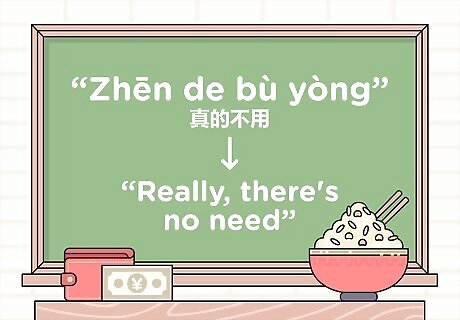
Use "zhēn de bù yòng" (真的不用) to decline an offer for something tangible or specific. If someone offers to give you something or do something for you and you don't want them to do it, say "zhēn de bù yòng." This phrase, pronounced "jehn duh boo yohng," essentially means "really, there's no need." You will likely need to go through several rounds of this before the person accepts your refusal. For example, if you go out to lunch with a Chinese friend and they offer to pay for your meal, you might say "zhēn de bù yòng." You can switch up your word order as well. For example, you might say "bù yòng bù yòng zhēn de," which essentially means "no, no, really."
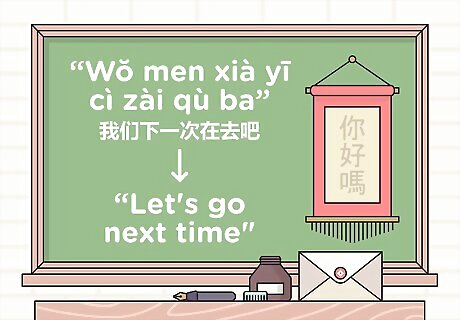
Try "wǒ men xià yī cì zài qù ba" (我们下一次在去吧) to decline an invitation. This phrase, pronounced "wo-ah mehn shah eee tsuh sigh choo bah," means "let's go next time." If someone invites you to go somewhere or do something with them, you can use this phrase to politely decline their invitation. This phrase implies that the proposed activity will happen, just that now is not the right time. However, keep in mind that the person may ask you again at a later point.Tip: If you're certain that you'll never accept the invitation, use "găi tiān ba" (改天吧), which also essentially means "next time." However, generally interpreted to mean that you will decline all future invitations as well.
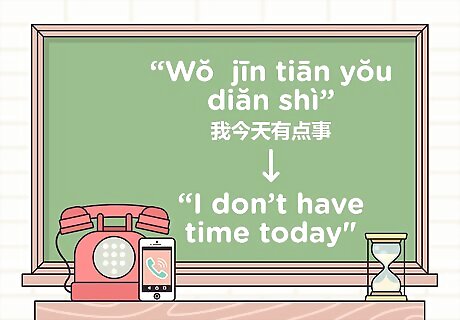
Mention "wŏ jīn tiān yŏu diăn shì" (我今天有点事) to imply you are much too busy. Just as in English, you might decline an invitation by saying your schedule is booked, in Chinese you can say "wŏ jīn tiān yŏu diăn shì," pronounced "wo-ah tchehn chieh yoh dee-ehn sheh." This phrase essentially means "I don't have time today." The phrase "wŏ jīn tiān méi yŏu kòng" (我今天没有空) also means "I don't have time today." These phrases imply that accepting the invitation is out of your control because you've already made plans, thus softening the blow of rejection. You can also combine phrases together to soften the blow even further. For example, you might say "wŏ jīn tiān yŏu diăn shì. Găi tiān ba." (I'm too busy today. Next time.)




















Comments
0 comment